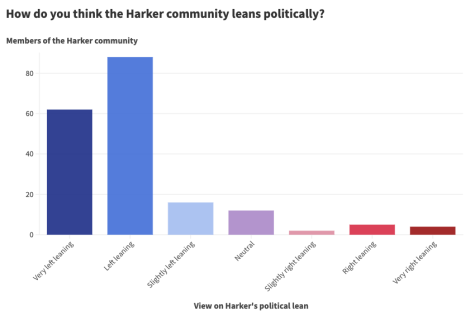Editorial: Diversity of thought promotes inclusivity
Not only should we accept when others disagree with us, we need to actively seek out other opinions and encourage the sharing of different perspectives. To accomplish this, we need to acknowledge the gaps in our own knowledge and use the resources and people around us to gain a better understanding of our community.
Can schools be places of free inquiry while remaining safe harbors for learning? Schools across the country grapple with the balance between promoting ideas reflecting the beliefs of their student body and preventing threats to marginalized demographics. The result? A student population that follows homogeneous thinking to avoid judgment from their peers.
As the Harker administration and students try to promote a more diverse campus, rather than encouraging an open-minded community, our efforts can restrict the sharing of different perspectives. When we are only exposed to the same viewpoints, we become overconfident in our beliefs and less tolerant of those who hold different views. A lack of empathy for others and reluctance to engage in meaningful debate results in a school community that is an echo chamber: without alternate viewpoints and ideas, the Harker environment cultivates a student body that is uniform in its beliefs.
In an anonymous survey sent out to all students and staff on a Schoology post on April 19, 87.9% of the 189 respondents agreed that our community is at least slightly left leaning, with 32.8% agreeing that Harker is very left leaning, from a political standpoint. Furthermore, 27.0% of respondents agree that they are exposed to diverse viewpoints at Harker. In the same way that we choose to stress the importance of diversity, we limit it.

Narrow-mindedness regarding others’ opinions also leads to the prevalence of “cancel culture,” which creates an environment where simple statements become perceived insults. Of the surveyed students and staff, only 27.0% disagreed with the idea that individuals in our community approach disagreements with defensiveness and hostility.
Respect is a critical component of healthy discourse. When we view issues as black and white, brushing a perspective aside without considering different nuances and arguments, we tend towards being short-sighted. Even if we ultimately disagree with an opinion, focusing on the issues at hand while avoiding personal attacks will help us foster a more civil conversation.
Though respect serves as an important aspect of promoting a more inclusive environment, adopting a more proactive approach is necessary for real change. We also need to actively seek out other opinions and encourage the sharing of different perspectives, beyond simply accepting when others disagree with us. To accomplish this, we need to acknowledge the gaps in our own knowledge and use the resources and people around us to gain a better understanding of our community.

Jessica Wang (12) is a Managing editor for the Winged Post, and this is her fourth year on staff. This year, she wishes to cover a greater breadth of content...




![LALC Vice President of External Affairs Raeanne Li (11) explains the International Phonetic Alphabet to attendees. "We decided to have more fun topics this year instead of just talking about the same things every year so our older members can also [enjoy],” Raeanne said.](https://harkeraquila.com/wp-content/uploads/2025/10/DSC_4627-1200x795.jpg)


















![“[Building nerf blasters] became this outlet of creativity for me that hasn't been matched by anything else. The process [of] making a build complete to your desire is such a painstakingly difficult process, but I've had to learn from [the skills needed from] soldering to proper painting. There's so many different options for everything, if you think about it, it exists. The best part is [that] if it doesn't exist, you can build it yourself," Ishaan Parate said.](https://harkeraquila.com/wp-content/uploads/2022/08/DSC_8149-900x604.jpg)




![“When I came into high school, I was ready to be a follower. But DECA was a game changer for me. It helped me overcome my fear of public speaking, and it's played such a major role in who I've become today. To be able to successfully lead a chapter of 150 students, an officer team and be one of the upperclassmen I once really admired is something I'm [really] proud of,” Anvitha Tummala ('21) said.](https://harkeraquila.com/wp-content/uploads/2021/07/Screen-Shot-2021-07-25-at-9.50.05-AM-900x594.png)







![“I think getting up in the morning and having a sense of purpose [is exciting]. I think without a certain amount of drive, life is kind of obsolete and mundane, and I think having that every single day is what makes each day unique and kind of makes life exciting,” Neymika Jain (12) said.](https://harkeraquila.com/wp-content/uploads/2017/06/Screen-Shot-2017-06-03-at-4.54.16-PM.png)








![“My slogan is ‘slow feet, don’t eat, and I’m hungry.’ You need to run fast to get where you are–you aren't going to get those championships if you aren't fast,” Angel Cervantes (12) said. “I want to do well in school on my tests and in track and win championships for my team. I live by that, [and] I can do that anywhere: in the classroom or on the field.”](https://harkeraquila.com/wp-content/uploads/2018/06/DSC5146-900x601.jpg)
![“[Volleyball has] taught me how to fall correctly, and another thing it taught is that you don’t have to be the best at something to be good at it. If you just hit the ball in a smart way, then it still scores points and you’re good at it. You could be a background player and still make a much bigger impact on the team than you would think,” Anya Gert (’20) said.](https://harkeraquila.com/wp-content/uploads/2020/06/AnnaGert_JinTuan_HoHPhotoEdited-600x900.jpeg)

![“I'm not nearly there yet, but [my confidence has] definitely been getting better since I was pretty shy and timid coming into Harker my freshman year. I know that there's a lot of people that are really confident in what they do, and I really admire them. Everyone's so driven and that has really pushed me to kind of try to find my own place in high school and be more confident,” Alyssa Huang (’20) said.](https://harkeraquila.com/wp-content/uploads/2020/06/AlyssaHuang_EmilyChen_HoHPhoto-900x749.jpeg)



